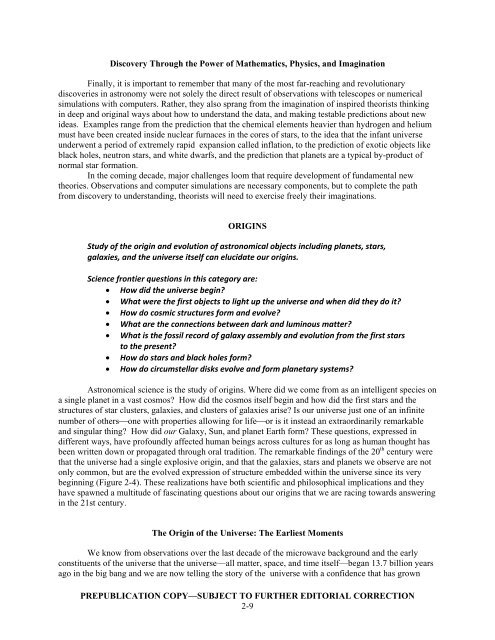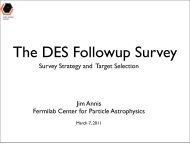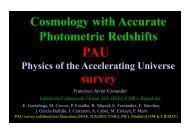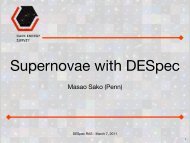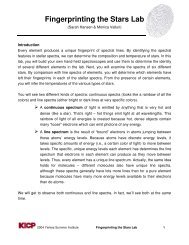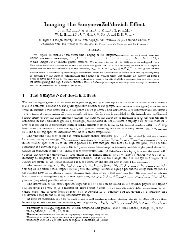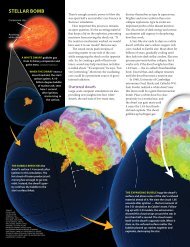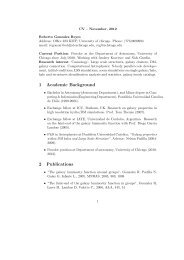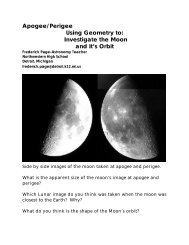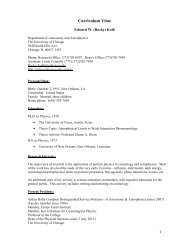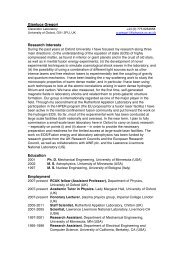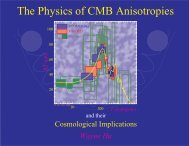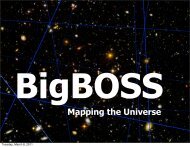prepublication copy - The Department of Astronomy & Astrophysics ...
prepublication copy - The Department of Astronomy & Astrophysics ...
prepublication copy - The Department of Astronomy & Astrophysics ...
Create successful ePaper yourself
Turn your PDF publications into a flip-book with our unique Google optimized e-Paper software.
Discovery Through the Power <strong>of</strong> Mathematics, Physics, and Imagination<br />
Finally, it is important to remember that many <strong>of</strong> the most far-reaching and revolutionary<br />
discoveries in astronomy were not solely the direct result <strong>of</strong> observations with telescopes or numerical<br />
simulations with computers. Rather, they also sprang from the imagination <strong>of</strong> inspired theorists thinking<br />
in deep and original ways about how to understand the data, and making testable predictions about new<br />
ideas. Examples range from the prediction that the chemical elements heavier than hydrogen and helium<br />
must have been created inside nuclear furnaces in the cores <strong>of</strong> stars, to the idea that the infant universe<br />
underwent a period <strong>of</strong> extremely rapid expansion called inflation, to the prediction <strong>of</strong> exotic objects like<br />
black holes, neutron stars, and white dwarfs, and the prediction that planets are a typical by-product <strong>of</strong><br />
normal star formation.<br />
In the coming decade, major challenges loom that require development <strong>of</strong> fundamental new<br />
theories. Observations and computer simulations are necessary components, but to complete the path<br />
from discovery to understanding, theorists will need to exercise freely their imaginations.<br />
ORIGINS<br />
Study <strong>of</strong> the origin and evolution <strong>of</strong> astronomical objects including planets, stars,<br />
galaxies, and the universe itself can elucidate our origins.<br />
Science frontier questions in this category are:<br />
• How did the universe begin<br />
• What were the first objects to light up the universe and when did they do it<br />
• How do cosmic structures form and evolve<br />
• What are the connections between dark and luminous matter<br />
• What is the fossil record <strong>of</strong> galaxy assembly and evolution from the first stars<br />
to the present<br />
• How do stars and black holes form<br />
• How do circumstellar disks evolve and form planetary systems<br />
Astronomical science is the study <strong>of</strong> origins. Where did we come from as an intelligent species on<br />
a single planet in a vast cosmos How did the cosmos itself begin and how did the first stars and the<br />
structures <strong>of</strong> star clusters, galaxies, and clusters <strong>of</strong> galaxies arise Is our universe just one <strong>of</strong> an infinite<br />
number <strong>of</strong> others⎯one with properties allowing for life⎯or is it instead an extraordinarily remarkable<br />
and singular thing How did our Galaxy, Sun, and planet Earth form <strong>The</strong>se questions, expressed in<br />
different ways, have pr<strong>of</strong>oundly affected human beings across cultures for as long as human thought has<br />
been written down or propagated through oral tradition. <strong>The</strong> remarkable findings <strong>of</strong> the 20 th century were<br />
that the universe had a single explosive origin, and that the galaxies, stars and planets we observe are not<br />
only common, but are the evolved expression <strong>of</strong> structure embedded within the universe since its very<br />
beginning (Figure 2-4). <strong>The</strong>se realizations have both scientific and philosophical implications and they<br />
have spawned a multitude <strong>of</strong> fascinating questions about our origins that we are racing towards answering<br />
in the 21st century.<br />
<strong>The</strong> Origin <strong>of</strong> the Universe: <strong>The</strong> Earliest Moments<br />
We know from observations over the last decade <strong>of</strong> the microwave background and the early<br />
constituents <strong>of</strong> the universe that the universe—all matter, space, and time itself—began 13.7 billion years<br />
ago in the big bang and we are now telling the story <strong>of</strong> the universe with a confidence that has grown<br />
PREPUBLICATION COPY—SUBJECT TO FURTHER EDITORIAL CORRECTION<br />
2-9


